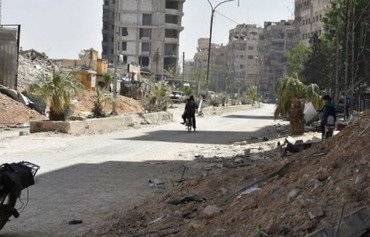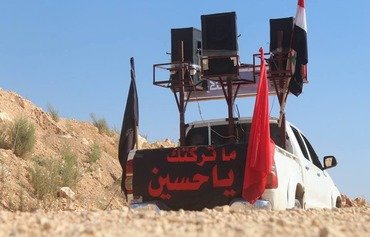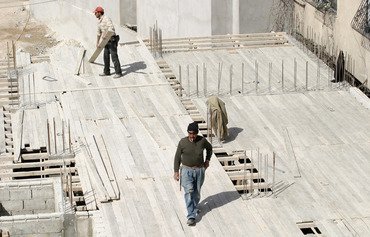By heavily promoting the doctrine of Wilayat al-Faqih (Guardianship of the Jurist) in institutions in Syria, Iran's Islamic Revolutionary Guard Corps (IRGC) is attempting to exert control over the country's Shia population, experts said.
IRGC-affiliated militias owe their allegiance to al-Wali al-Faqih (Guardian of the Jurist, Ayatollah Khamenei), who is the top and sole authority over the IRGC.
To encourage similar allegiance among a broad swath of the Syrian population, the doctrine is being actively disseminated through various religious, social and educational institutions, Syrian lawyer Bashir al-Bassam told Diyaruna.
The aim is to raise a new generation of Syrian youth who owe their full loyalty to al-Wali al-Faqih and the IRGC, he said.
![Al-Mustafa International University director Sheikh Samer Obeid takes part in a ceremony at the university, where the flags of Hizbullah and Iran are displayed alongside the university's flag. [Photo courtesy of Bashir al-Bassam]](/cnmi_di/images/2018/08/16/14028-Mustafa-University-director-600_384.jpg)
Al-Mustafa International University director Sheikh Samer Obeid takes part in a ceremony at the university, where the flags of Hizbullah and Iran are displayed alongside the university's flag. [Photo courtesy of Bashir al-Bassam]
These institutions are scattered across Syria, al-Bassam said, and include Al-Mustafa International University, which is affiliated with the IRGC's elite Quds Force.
"Students are trained to give their absolute loyalty to Quds Force’s commanders, and receive military training at IRGC training centres inside Syria and in Iran."
Similarly, in al-Rasoul al-Adham complex, students graduate after studying religious sciences and become mosque imams and clerics, al-Bassam said.
Seven secondary schools and 750 mosques are affiliated with this complex, in addition to 50 Qur'an memorization centres that graduate thousands of Syrian students each year, he noted.
Co-ordination with the Quds Force is done through Brig. Gen. Javad Ghaffari and Brig. Gen. Majeed Alavi.
Students attending the Sayyidah Ruqayya complex -- a seminary that has branches in Damascus, Latakia, Homs and Nubl -- enroll as they would do at a university, and earn up to a doctorate degree.
Institutions controlled by Iran
These institutions are ultimately controlled by Khamenei’s representative in Syria, Abu al-Fadl Tabtabai Ashkathari, al-Bassam said.
Ashkathari co-ordinates directly with IRGC and Quds Force commanders to provide moral, logistical and manpower support in combat zones where IRGC units and militias affiliated with it are positioned, he added.
Al-Bassam warned that the danger posed by the IRGC's attempts to influence and control the Syrian population is no less serious than direct military intervention.
"This move will allow the IRGC to remain in Syria for many years by building a new generation that owes its loyalty to distorted religious teachings that seek to control the minds of the Syrian youth," he explained.
Extremist groups such as the "Islamic State of Iraq and Syria" (ISIS) have used similar methods to recruit thousands of youth to their cause, he said.
"This scheme will foster sectarian division in Syrian society that will be an obstacle to any attempt to restore cohesion among the population," he said.
In pursuit of this goal, he added, the IRGC has gone beyond areas controlled by the Syrian regime, and has infiltrated tribal areas through these institutions.
This move, along with some financial inducements, has managed to ensure the loyalty of some tribes, he said.

![Iranian cleric Alireza Arafi, chairman of Al-Mustafa International University, meets with the Iranian ambassador to Damascus. [Photo courtesy of Bashir al-Bassam]](/cnmi_di/images/2018/08/16/14027-Iranian-cleric-Damascus-600_384.jpg)






